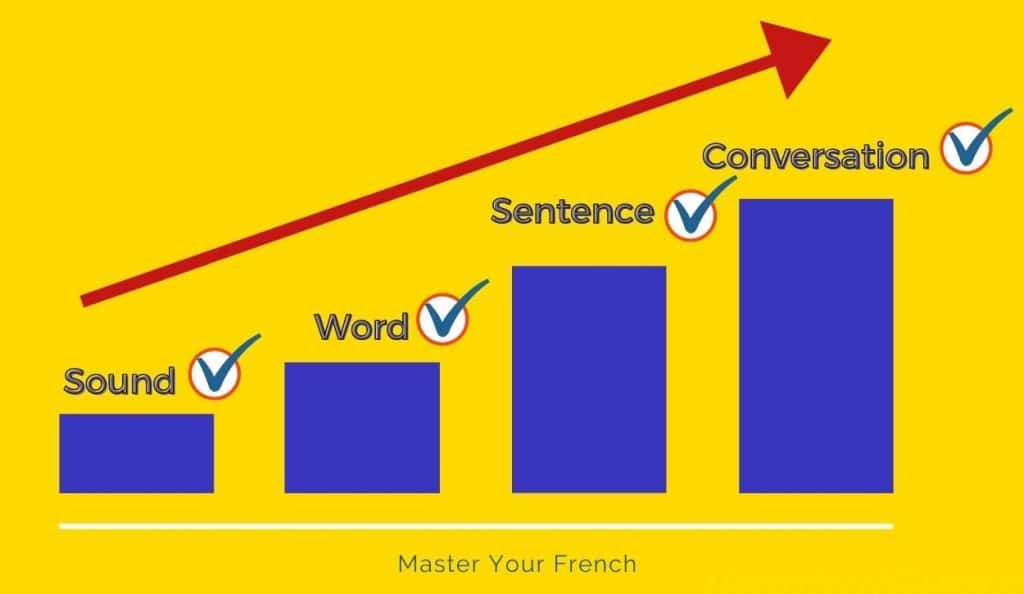4 ways to improve your French pronunciation
Updated: 23 March, 2023 by Mylene in Guides and Tips ▪

For many learners, French pronunciation can be a challenge. As language enthusiasts, we know that mastering the nuances of pronunciation is key to fluency and comprehension. Therefore, we’ll be diving into tips to help you improve your French pronunciation. In this article, I will provide various tips and advice that will help anyone learning French to improve.
By following these steps, you’ll progress faster and improve your French pronunciation. You can start doing these steps right now.
In this post, you’ll learn:
- The benefits of better French pronunciation
- Steps to take to improve your French pronunciation
- Tips to improve your French pronunciation (a video)
What are the benefits of better French Pronunciation?
Pronunciation is key for successful communication. Overcoming pronunciation difficulties is what many non-native French speakers want to achieve when studying French.
The French nasal vowels, the French “r”, liaison, and intonation can make French pronunciation difficult, as well as challenging for French learners. Poor pronunciation can even change the meaning and put effective communication at risk.
The benefits of good pronunciation include:
- Successful communication. Having a good pronunciation makes the communication flow between French native and non-native much easier. Intelligibility makes less complex and more predictable the ideas you’re trying to convey.
- Good impression. While poor pronunciation puts pressure on non-native speakers during everyday conversations, good pronunciation enables one to communicate effectively and feel confident to show off all your other French language skills.
- Less awkward situations. Bad pronunciation can cause misunderstandings and awkward situations. Many French words have similar sounds but have different meanings. This can cause confusion and put you in an unwanted situation.
- Faster learning. When the sounds you hear and the sounds you pronounce are similar, you’ll be able to learn French faster. Avoid doubling the effort required when learning French by getting your pronunciation close enough to one that native speakers have.
You want to learn French, and you’re dreaming of no longer being challenged when communicating in French, that’s right?
The first step is to adopt some simple habits and learn some basic techniques that will yield a positive return and become one of the most effective self-improvement strategies for language learners.
The following strategies and exercises can help you feel less challenged when speaking French and get good French pronunciation instead.
1. Pronounce every sound individually
Learning how and where to pronounce each sound is important.
We don’t have the same mother tongue, and we don’t come from the same country, but we all have the same mouth.
Let’s see, take the word croissant. How to pronounce the sound “an” in the word croissant?
For this sound, you have to know whether the tongue must touch the lower teeth, or if you have to vibrate your vocal cords while saying “an”?

2. Learn to pronounce the difference between two sounds
French learners get confused with the nasal vowels /ɑ̃/ and /ɛ̃/.
You may have the same challenge. In that case, you should have a list of words with these 2 sounds, such as:
- vin / vent (pronounced /vɛ̃/ – /vɑ̃/)
- pain / paon (pronounced /pɛ̃/ – /pɑ̃/)
- thym / temps (pronounced /tɛ̃/ – /tɑ̃/)
In front of a mirror, try to pronounce these words and try to see the difference.
- sound /ɛ̃/ : the mouth should be slightly open, and the tongue is forward.
- sound /ɑ̃/ : the mouth is much more open and the tongue is back.
Let’s see with two exercises you can start doing right now to improve your French pronunciation.
Look Silly
There are many exercises you can do to improve your French pronunciation. Among the exercises:
- Pick a word and exaggerate it out loud.
- You have to aim for an almost stereotypical accent.
- You have to EXAGGERATE the pronunciation!
- Ignore anyone in the room with you who thinks you look silly.
- After a while, try saying the word normally. This will help you sound more natural.
Get a muscle memory
- You already know how to pronounce the sentence because you already did the exaggeration exercise.
- Now you have to repeat the same word or the same sentence over and over.
- Thanks to that, your muscles will know how to act the next time you pronounce these words.
Also, don’t forget to check our pronunciation course to learn French online.
3. Listen to Yourself
I know… listening to yourself speaking French can be painful in the beginning.
But believe me, it’s worth it!
- Read and record a short paragraph in French from a book, a magazine or a newspaper.
- Play it back multiple times.
- Make note of the places where you mispronounce a word.
- Try again to pronounce correctly.
Try practicing your pronunciation with this list of difficult French words.
4. Have a conversation from day one
Here is the fourth piece of advice that will boost your performance and make you exercise your pronunciation and vocabulary at the same time.
- This will let you get live feedback.
- You don’t need to speak for an hour. Personally, I find that it is ideal to have a discussion of 25 minutes.
- Having a conversation from day one with a native French speaker is also a huge confidence booster!
- Once you’ve had one conversation, you’ll definitely want to have another one!
So now you have the four ways to improve your French Pronunciation.
How to improve your French pronunciation (a video)
Be sure to watch the video to learn more about how to improve your French pronunciation.
My advice is to break down this process into different parts based on what Arthur Ashe, the professional tennis player, once said:
Start where you are.
Use what you have.
Do what you can.
What are you waiting for to start using these four ways to improve your French pronunciation?
Want some help to get your French pronunciation better?
The French language, with its unique set of sounds and intonation, can prove challenging for non-native speakers. Luckily, there are online solutions available to help you refine your French pronunciation skills. When it comes to choosing an online course for French pronunciation, look for one that provides a range of resources, such as video and audio exercises, and, most importantly, created by an expert in French phonetics.
One such course is “The All-In-One Toolkit To Improve Your Pronunciation” from Master Your French. This course provides an in-depth exploration of French pronunciation, covering everything from individual sounds to more complex intonation patterns. Through a series of video exercises and quizzes, learners can practice and perfect their pronunciation skills in a supportive and engaging environment.


